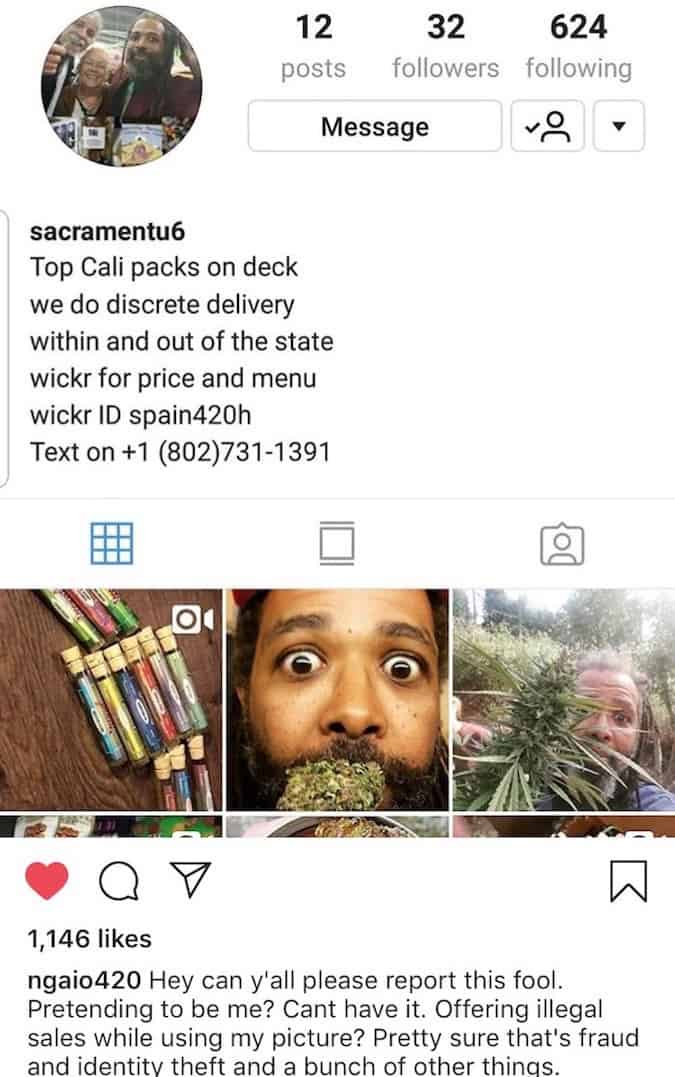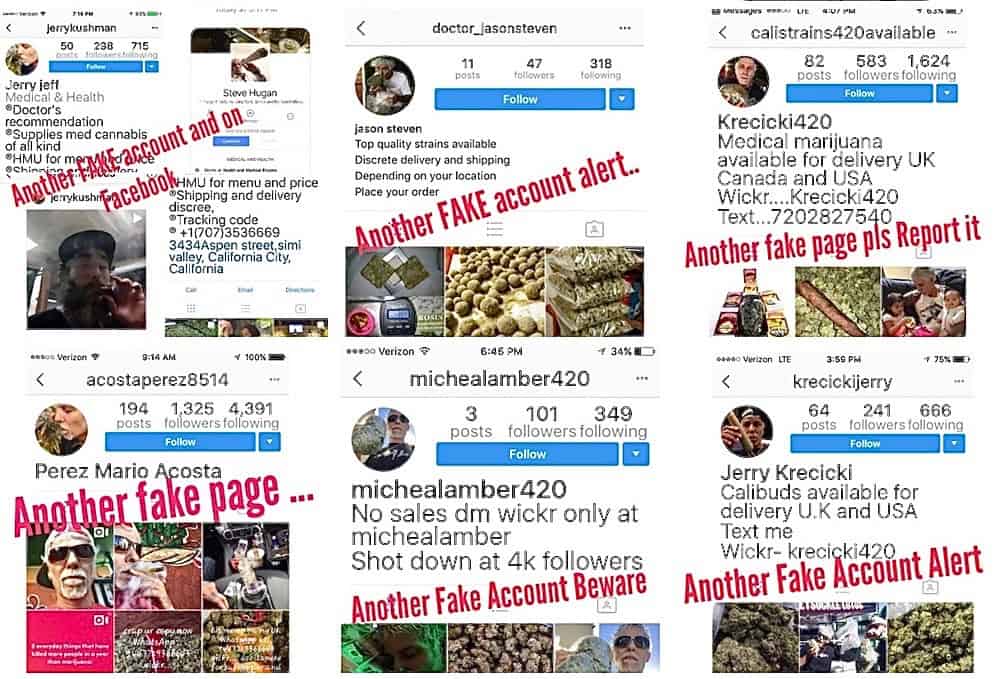
Weed Scams are Trending on Instagram—and People are Falling for Them
Rerolled from a High Times Original Article
Ngaio Bealum (@ngaio420), writer, comedian, and resident cannaseur on the Netflix show Cooking on High, told High Times that he makes his connection to California’s legal pot industry obvious in his Instagram posts. Little did he know that by doing so, it made his social media identity vulnerable to imposters attempting to scam people.
“I got a lot of pictures of me, sitting out there holding giant bags of weed, or sitting on a farm or whatnot because that’s what I do,” Bealum says. “I love hanging out at the farm.”
But last week, a friend sent Bealum a screenshot of an Instagram profile that had an image of Bealum and a group of his friends as the main photo. The account had 12 of images lifted off of Bealum’s real account—and the bio offered pot for sale, with shipping available to any location.
“Whoever that person was had just stolen all those shots and posted them up like I was out here selling weed across state lines to all kinds of people, which we cannot have,” Bealum says. “I don’t sell weed. I love marijuana, but I don’t sell it.”
What happened to Bealum is just one example of thousands, however. From A-list celebrities to popular figures in the cannabis industry, social media has become a means through which low-level identity theft and scams are a regular occurrence. Particularly on Instagram, the faces of cannabis influencers are being used to facilitate fraudulent drug deals. And the people often left suffering are the those just trying to score some weed.

After being made aware of the imposter account, Bealum notified Instagram and posted a screenshot of the fake profile, asking his 57,000 followers to report it as well. Bealum believes that the added pressure spurred Instagram to act quickly—the bogus profile was removed from the platform within a couple of hours.
“Top Cali packs on deck,” the fake Instagram bio said. “We do discrete delivery within and out of state. Wikr for price and menu…”
(In this case, the way to determine the Instagram account is a scam is because they don’t use the right “discreet” in a sentence. But more on that later.)
Lynn Thomas (@greengoldfarms) of Green Gold Farms in San Diego has seen dozens of Instagram users purporting to be him and offering weed for sale. And what’s worse, he’s heard from people who have been scammed by them.
On several occasions, Thomas says he’s received Instagram direct messages from people who have wired money to one of the imposters for weed they never received. He hates having to be the one to let people know they’ve been scammed.
Thomas says the social media imposters have devised themselves a good racket: victims aren’t likely to seek a refund from a payment service or complain to the police. “I see how it works,” he says, “and there’s [almost] no way to get caught.”
There was one scam victim in particular who contacted Thomas after sending an imposter $2,600 for two pounds of pot that never arrived. Thomas said that even if the scammer is only successful a couple of times a month, at that rate, it’s not a bad take.
Like Bealum, when Thomas gets wind of imposter accounts he notifies Instagram immediately. He then shares a post calling out the scammer and asks his followers to spread the word and report the account. More than anything, Thomas says he doesn’t want more people to have their money stolen, and he also doesn’t want to run into anyone angry about being victimized.
“At the end of the day, they’re using my face to rip people off,” said Thomas.

Courtesy of Jerry Krecicki
Photographer Jerry Krecicki (@jerrykrecicki), whose work has graced the pages of High Times, is another cannabis influencer who’s been impersonated on Instagram and other social media platforms. “I grew up in Everglade City and Naples, Florida—the hub of where all the marijuana came into the country back in the ’80s,” he says. “I started taking pictures of cannabis and growing cannabis at 14-years-old.”
Krecicki said that he was first impersonated by a scammer on social media a couple of years ago.
“I got a message from a friend of mine, complaining to me that he couldn’t believe I was selling cannabis online. I asked him what he was talking about and he pulled the page up. The original page was using pictures of me and my family members for pushing cannabis. So I reported it to Instagram, and I got it deleted.”
He said that with decades in the industry, criminals find his identity attractive to assume. It happens continuously, and Krecicki believes that a repeat offender is to blame.
“I get an average of three to five a week,” Krecicki says. “They’re all from the same guy, normally, that’s doing them. Over the last two years, it’s been a chronic pattern of the same crew doing these fake pages.”

Jerry Krecicki
When contacted for this story, an Instagram spokesperson noted that claiming to be another person violates the platform’s Community Guidelines. The company uses automated tools to detect fake accounts and has more than 20,000 employees working on safety and security—twice as many as last year. Every day, millions of fake accounts are blocked at registration.
“We care deeply about the quality of content on Instagram. And we take spam, inauthentic and other abusive behavior very seriously. When we find inauthentic activity, we work to counter and prevent it, including blocking accounts and removing violating content all at once. We review suspicious activity closely and take the time to understand how to help prevent similar activity in the future,” the spokesperson said via email.
So, how can you determine if a profile you’re following is the real deal? Jonathan Lepow, owner and co-founder of Top Tree (@toptree), a social media digital advertising agency, said that influencers can complete a verification process to assure their followers the profile is legitimate.
“Ultimately, being verified is a great way to know if the person that you’re talking to is legitimately that person,” Lepow says. “But not everybody can be verified,”
There are requirements to meet for an account to attain a verified status. And the existence of imposter profiles could expedite the process.
“When you show a need to Instagram to have your page verified because people are copying you, that can sometimes be a motivator to get an account verified,” said Lepow.
He added that it should be obvious that social media should not be considered a safe way to find your next pot connection.
“If you’re putting yourself in the position to where you’re purchasing cannabis online, you gotta be ready to be scammed,” Lepow said. “Paypal isn’t going to return your money because the drugs weren’t delivered.”
In Bealum’s case, the bio of the fake account had misspellings, which is sacrilege for a writer and a massive indicator that something’s off. Bealum did, however, offer a generous solution for anyone having a hard time finding weed: “People can follow me on Instagram,” he says, “and if they want weed from me, they just gotta come over and we can just smoke.”
The post Weed Scams are Trending on Instagram—and People are Falling for Them appeared first on High Times.
Rerolled from High Times